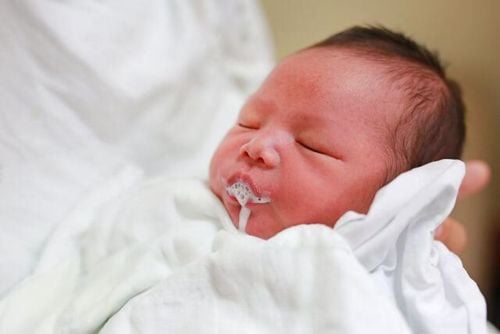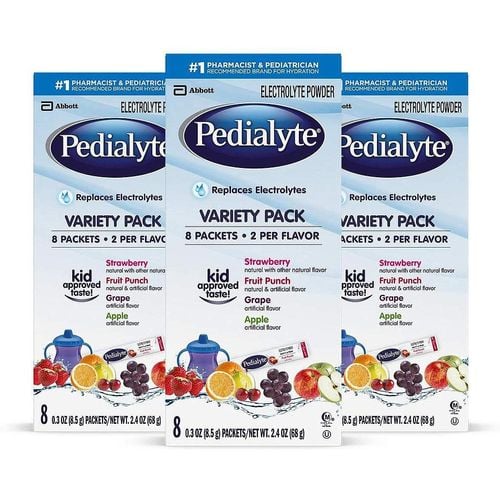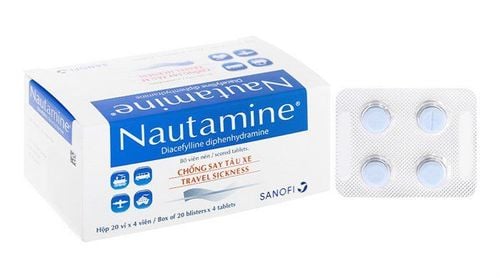This is an automatically translated article.
Posted by Master, Doctor Mai Vien Phuong - Gastrointestinal Endoscopy - Department of Medical Examination & Internal Medicine - Vinmec Central Park International General Hospital
Vomiting is a common condition, in each age, vomiting is caused by different causes. Depending on the condition and age, the treatment method also has different points.
Vomiting is the expulsion of stomach contents through the mouth, which can also be a response to irritation in the intestines. Vomiting is not a condition, but a symptom of other conditions. Some of these conditions are serious, but most are not cause for concern.
Vomiting can happen only once, especially from eating or drinking something unsettled in the stomach. However, persistent vomiting can be a sign of an emergency or a serious underlying medical condition.
1. The main cause of vomiting
The most common causes of vomiting vary in adults, infants and pregnant or menstruating women.
1.1 Vomiting in Adults The most common causes of vomiting in adults include:
Foodborne illness (food poisoning) Indigestion Bacterial or viral infections, such as viral gastroenteritis , Motion sickness Chemotherapy Migraines Antibiotics, morphine, or anesthesia Drinking too much alcohol Appendicitis Acid reflux or GERD Gallstones Anxiety Soreness Exposure to toxins, such as lead Crohn's disease Irritable Bowel Syndrome (IBS) Concussion Food Allergy 1.2 Vomiting in infants Common causes of vomiting in infants include:
Viral gastroenteritis Swallowing milk too quickly, possibly due to a hole in the nipple of the bottle that is too large Food allergy Milk intolerance Other types of infections, including urinary tract infections (UTIs), middle ear infections, pneumonia or meningitis. Accidental ingestion of congenital pyloric stenosis, a condition present at birth in which the passageway from the stomach to the intestines is narrowed so that food cannot pass easily. Intussusception when one loop of bowel inserts itself into another loop leading to obstruction is a medical emergency.

1.3 Vomiting during pregnancy Causes of vomiting in pregnant women include:
Morning sickness Acid reflux Foodborne illness (food poisoning) Migraines Sensitivity to certain smells or tastes Extreme morning sickness Symptoms, known as morning sickness, are caused by increased hormones Menstrual Vomiting, hormonal changes during your period can make you nauseous and give you a hangover. Some women also experience migraines during their period, which can also cause vomiting.
2. How to treat vomiting
Treatment of vomiting depends on the underlying cause. Drinking plenty of water and sports drinks that contain electrolytes can help prevent dehydration.
2.1 Adult Treatment Consider these home remedies:
Eat small meals consisting of only light and simple foods (rice, bread, crackers or the BRAT diet) ). Drink clear liquids. Rest and avoid physical activity. Over-the-counter (OTC) medications such as Imodium and Pepto-Bismol can help with nausea and vomiting as you wait for your body to fight the infection Depending on the cause, your doctor may prescribe an anti-emetic, such as ondansetron (Zofran) ), granisetron or promethazine. Some common antacids, such as antacids or other prescription medications, can help treat symptoms of acid reflux. Anti-anxiety medication may be prescribed if your vomiting is related to anxiety.
2.2 Treatment of infants Keep the infant on his or her stomach or side to reduce the risk of aspiration of vomit. Make sure your baby consumes extra fluids, such as water, sugar water, rehydration solution (Pedialyte) or gelatin, if he is still breastfeeding continue to breastfeed regularly.
See a doctor if your child refuses to eat or drink anything for more than a few hours.
2.3 Pregnancy Treatment Pregnant women with morning sickness or severe nausea may need intravenous fluids if they are unable to keep any fluids down. More severe cases of hematemesis may require total parenteral nutrition.
Your doctor may also prescribe an antiemetic, such as promethazine, metoclopramide (Reglan), or droperidol (Inapsine), to help prevent nausea and vomiting. These medications can be taken by mouth, injection, or suppositories.

3. When to see the doctor?
Adults and infants should seek medical attention if, with persistent vomiting for more than a day, any fluid cannot be retained. When vomiting, there is green vomit or bloody vomit.
The body, showing signs of severe dehydration, such as fatigue, dry mouth, excessive thirst, sunken eyes, rapid heart rate, and little or no urine. In infants, signs of severe dehydration also include crying without tears and sleepiness, significant weight loss since the onset of vomiting, and persistent vomiting for more than a month.
Pregnant women should see a doctor if nausea and vomiting prevent them from eating or drinking or keeping anything in their stomach.
4. Emergency medical care in case of vomiting
Vomiting accompanied by the following symptoms should be treated as a medical emergency:
Severe chest pain Sudden and severe headache Shortness of breath Blurred vision Sudden abdominal pain Neck stiffness and high fever Blood in vomit Infants younger than 3 months with a rectal fever of 100.4oF (38oC) or higher, with or without vomiting, should see a doctor.
5. Care and recovery after vomiting
Drinking plenty of water and other fluids to replenish lost fluids is important after vomiting. Start slowly by sipping water or sucking on shaved ice, then add in clearer liquids like sports drinks or juices. You can make your own rehydration solution with:
1/2 teaspoon salt 6 teaspoons sugar 1 liter of water You should not eat much after vomiting. Start with savory biscuits or plain rice or bread. You should also avoid foods that are difficult to digest, like:
Milk Cheese Caffeine Fatty or fried foods Spicy foods After vomiting, you should rinse your mouth with cool water to remove stomach acid that can damage teeth your. Do not brush your teeth immediately after vomiting as this can damage already weak enamel.

Regardless of the subject, when vomiting persists, you need to immediately go to medical facilities to be checked by a doctor and have timely intervention. Avoiding this condition for a long time can affect health and be difficult to treat.
Currently, the Department of Gastroenterology - Vinmec International General Hospital is proficient in gastrointestinal endoscopic techniques for diagnosis, emergency intervention and treatment for vomiting cases. Through the examination process, the doctor will find out the cause and it is necessary to coordinate with many different specialties for the most effective treatment.
Hospital visits are always performed by a team of highly qualified doctors with many years of experience in the profession. Therefore, customers can completely trust the quality at the hospital.
Please dial HOTLINE for more information or register for an appointment HERE. Download MyVinmec app to make appointments faster and to manage your bookings easily.
References
Hyperemesis gravidarum (severe nausea & vomiting during pregnancy). (2016).
my.clevelandclinic.org/health/diseases/12232-hyperemesis-gravidarum-severe-nausea--vomiting-during-pregnancy
Lete I, et al. (2016). The effectiveness of ginger in the prevention of nausea and vomiting during pregnancy and chemotherapy. DOI:
4137/IMI.S36273
Mayo Clinic Staff. (2018). Intussusception.
mayoclinic.org/diseases-conditions/intussusception/symptoms-causes/syc-20351452
Mayo Clinic Staff. (2018). Nausea and vomiting.
mayoclinic.org/symptoms/nausea/basics/when-to-see-doctor/sym-20050736?p
Nausea and vomiting: Possible causes. (2019).
my.clevelandclinic.org/health/symptoms/8106-nausea--vomiting/possible-causes














